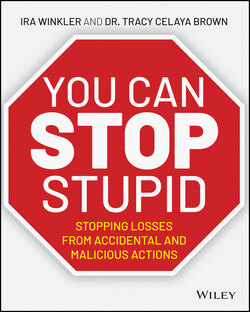Читать книгу You CAN Stop Stupid - Ira Winkler - Страница 24
We Propose a Strategy, Not Tactics
ОглавлениеWe described in the book's introduction how the scuba and loss prevention industries look at the concept of mitigating loss as a comprehensive strategy. When organizations fail to do this, they attempt to implement random tactics that are not cohesive and supporting of each other. For example, if you think the fact that users create loss is an awareness failing and that the solution is better awareness, you are focusing on a single countermeasure. This approach will fail.
A comprehensive strategy is required to mitigate damage resulting from user actions. This book provides such a strategy. This strategy is something that should be applied to all business functions, at all levels of the organization. Wherever there can be a loss resulting from user actions or inactions, you need to proactively determine whether that loss is worth mitigating and then how to mitigate it.
NOTE Implementing the strategy across the entire business at all levels doesn't mean that every user needs to actively know and apply the depth and the breadth of the entire strategy. (The fry cook doesn't need to know how the accounting department works, and vice versa.) The team that implements the strategy coordinates its efforts in a way that informs, directs, and empowers every user to accomplish the strategy in whichever ways are most relevant for their role.
In an ideal world, you will always look at any user-involved process and determine what damage the user can initiate and how the opportunity to cause damage may be removed, as best as possible. If the opportunity for damage cannot be completely removed, you will then look to specify for the user how to make the right decisions and take the appropriate actions to manage the possibility of damage. You then must consider that some user will inevitably act in a way that leads to damage, so you consider how to detect the damaging actions and mitigate the potential for resulting loss as quickly as possible.
Minimally, when you come across a situation where a user creates damage, you should no longer think, “Just another stupid user.” You should immediately consider why the user was in a position to create damage and why the organization wasn't more effective in preventing it.
